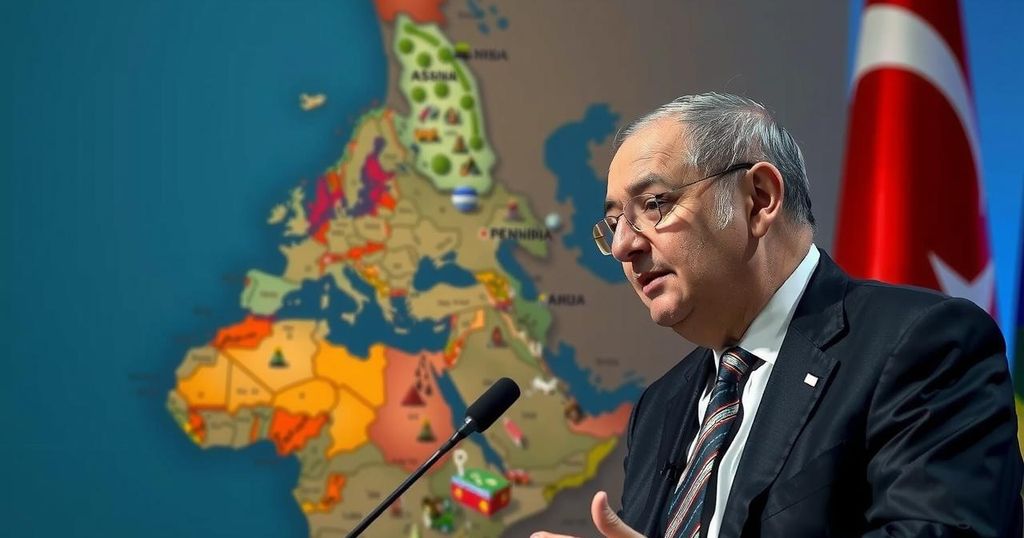Turkish Foreign Minister Hakan Fidan raised alarms about Israel’s intentions to relocate Palestinian Arabs into Egypt and Jordan, warning that this could destabilize the region. He critiqued Prime Minister Netanyahu’s military strategies, suggested potential conflicts involving Iran, and stressed the necessity for dialogue in Syria to achieve stability. Fidan’s comments encapsulate the ongoing tensions surrounding Israeli-Palestinian relations and the complex Syrian landscape.
In a recent interview with Hurriyet, a prominent Turkish newspaper, Turkish Foreign Minister Hakan Fidan articulated concerns regarding Israel’s strategic intentions towards Palestinian Arabs living in the Gaza Strip, Judea, and Samaria. Fidan claimed that Israel’s objective is to compel Palestinians to relocate into Egypt and Jordan, a movement he suggests would exacerbate regional instability. He stated, “Israel’s main goal is to force the Palestinian people from Gaza into Egypt and from the West Bank into Jordan,” warning that such actions would lead to heightened tensions in the Middle East. Fidan also remarked on potential escalations, especially in light of the forthcoming US elections, suggesting that Israeli Prime Minister Benjamin Netanyahu might pursue aggressive military actions, including targeting Iran’s nuclear capabilities. This could risk broadening the conflict beyond its current borders. He expressed skepticism toward Netanyahu’s methods during ceasefire negotiations, indicating, “Netanyahu employs the negotiation process as a tactic to postpone while advancing military objectives.” While acknowledging some advancement in talks between Israel and Hamas, Fidan emphasized the necessity for a ceasefire that would meaningfully alter Israel’s military approach. He recounted recent discussions with Hamas that covered on-ground conditions, the urgency of humanitarian assistance, and the need for reconciliation among Palestinian factions. Moreover, addressing the situation in Syria, Fidan noted that President Bashar Assad’s reluctance to foster relations with the Syrian opposition poses a challenge for peace in the region. He warned that if Syria fails to tackle its internal dilemmas, it could contribute to further instability. He stated, “It is very important that the regime provides a safe and stable environment for the people, including the opposition.” Fidan responded to Russian Foreign Minister Sergey Lavrov’s remarks about Moscow’s willingness to mediate Turkey-Syria dialogue, insisting that Assad must first initiate discussions with opposition factions to facilitate normalization. Unfortunately, Fidan concluded that Assad’s and his allies’ unwillingness to engage with opposition groups remains a significant barrier to achieving stability.
The comments from Turkish Foreign Minister Hakan Fidan highlight ongoing geopolitical tensions in the Middle East, particularly concerning Israel and the Palestinian territories, as well as the complex dynamics within Syria. Relations between Israel and the Palestinians have historically been fraught with conflict, leading to humanitarian crises and regional instability. Additionally, Turkey’s position as a regional power places it at a critical juncture where it seeks to mediate relations while addressing its own national interests and those tied to Syrian stability. The statements reflect the broader implications of foreign policy decisions made by Israel and the influence these have on neighboring nations.
In conclusion, the statements made by Turkish Foreign Minister Hakan Fidan underscore significant concerns regarding Israeli policies toward Palestinians and the potential for further destabilization in the region. He warns that actions aiming to displace Palestinian Arabs to neighboring countries could provoke heightened unrest. Moreover, the need for dialogue between the Syrian regime and opposition factions is emphasized as crucial for fostering stability and normalization in the region. The Turkish government continues to advocate for proactive engagement and dialogue to mitigate conflict and promote peace.
Original Source: www.jewishpress.com






